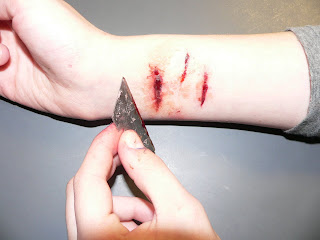Finished Title Sequence
As our film doesn't include long scenes of footage or complicated settings it was easy and quick to film.
Labels: Alex
Reading through our blog we realised that we have never properly explained our storyline, which may make some of our ideas quite confusing. Although we are only making the title sequence, we need to know where the film is going so we can show relating imagry in our title sequence.

We are going to use white. This represents his clear, naive and innocent ideas when young against the dark and disturbing images (shown behind) of his adulthood.
Size
The sizes will vary as each title will flicker and move between the ranges of size 10-size 18.
Position
The title will appear in different places depending on its relationship with other aspects of the shot. It will very rarely be central within in the shot. This will help to distort, alter and adjust the mise-en-scene of each shot.
Action
The title will flicker and blur. It will be un-focus and re-focus within the shot.
Duration/Speed
The title will flicker and move quite quickly but the wording itself will be on the screen for an approximate duration of 3-4 seconds.
Transitional Effects
The title will just appear within the shot.
Labels: Alex Rachel
These are our very first shots which we filmed yesterday. We will cut these down, like in our animatic, for the final title sequence. As we are still getting used to the equipment and style of filming, some of the shots did not go to plan, so we will not use them. Here is how our first ever day of filming went:
Labels: Rachel Tiffany Alex Charlotte
The first shots we decided to film were the ones of a girl slitting her wrist. We used the makeup that we brought in town to make it look it look as realistic as possible. It was quite difficult to apply, but we think we achieved the desired effect. We used Alex's wrist and the rest of us applied the stage makeup.
 We used the fake skin and scar makeup to create the first and largest cut
We used the fake skin and scar makeup to create the first and largest cut We applied the fake blood to make the wound look more realistic
We applied the fake blood to make the wound look more realistic This was our first completed scar.
This was our first completed scar. We then repeated this process to make a second scar.
We then repeated this process to make a second scar. We did this for a final time to create a third scar. Then we put more blood around the scars to make the skin look red and sore. We think having three scars makes it look more realistic than just one. We are very pleased with our final effect.
We did this for a final time to create a third scar. Then we put more blood around the scars to make the skin look red and sore. We think having three scars makes it look more realistic than just one. We are very pleased with our final effect.
As we havn't yet put any music or sounds to our animatic, we have been looking in class at possible non-diagetic and diagetic sounds for our title sequence.
Labels: Rachel
Here is an initial basic prop list (I'm sure, however, that we will end up adding stuff as we begin to prepare for our rough cut):

Labels: Alex Rachel
Animatic first edit (without music)
Labels: Rachel Tiffany Alex Charlotte
Labels: Alex
Labels: Tiffany and Charlotte
SAUL BASS (1920-1996) was not only one of the great graphic designers of the mid-20th century but the undisputed master of film title design thanks to his collaborations with Alfred Hitchcock, Otto Preminger and Martin Scorsese.
Labels: Tiffany
Quatro 38
Labels: Rachel
Whilst we were drawing our storyboard, we began to think about the credits we would need to include in our titles. We listed a group of the most commonly used ones which we found by watching other thriller title sequences. We will include:
Labels: Rachel Tiffany Alex
Vertigo
Labels: Rachel
Here's some mise-en-scene analysis of the title sequence from the somewhat dated thriller film "The Shining".
Labels: Alex
For our homework we were assesed to choose a thriller movies's title sequence of our choice and to analysis it. I chose Panic room directed by David Fincher whom is famous for his action packed films.
Labels: Charlotte
For our homework we were asked to analyse a thriller opening title sequence. As a group we devided up the different catorgories and all chose one to write about. I will be writing about the sound and how it tells the audience what the film will be about and how it builds suspence.
Labels: Tiffany
Here is our analysis of a thriller title sequence from a well-known film.
Labels: Alex, Charlotte, Rachel and Tiffany
Hello!
Labels: Rachel Tiffany Alex Charlotte